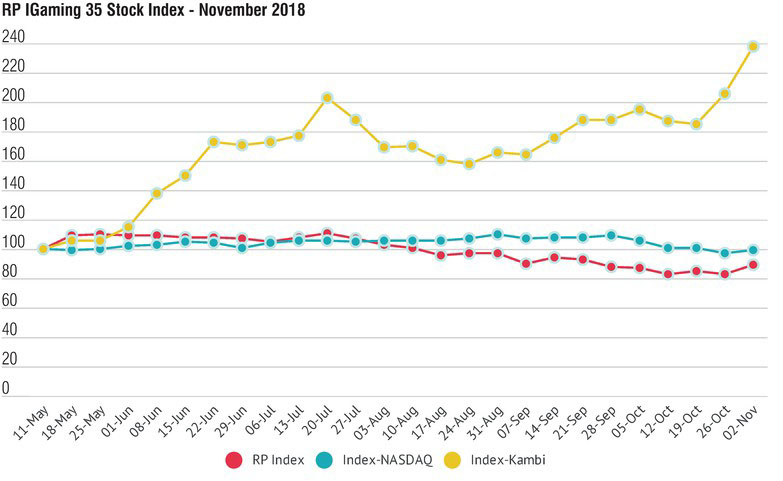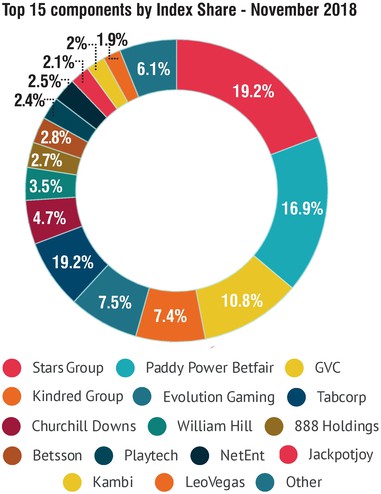October proved a challenging month for equities and gambling stocks were also hit. However, it is important to start with some overall perspective. In October the NASDAQ fell by 6.6%, an aggressive slide mirrored by most other markets. However, our weighted igaming index actually gained 2.2%, with 14 of the 35 constituents up and six of these by double-digit percentages (Aspire Global, Betsson, GiG, Kambi, MRG, NetEnt). Igaming therefore outperformed the overall market by eight percentage points – and since markets only really make sense relative to each other, an impressive outperformance.

However, the relative outperformance of October has come after two months of significant underperformance and so can probably be seen as more of a dead cat bounce than anything more fundamental. This appears to have been confirmed by further volatility early in November.
The most eye catching outperformance during the period was from Mr Green (MRG), which received an offer from William Hill and added 63% in the period. Indeed, MRG’s move accounted for 17% of the Index’s October growth. Alongside the bid, the other strongly positive performances had a very Nordic flavour. As well as Kambi, which we discuss in more detail below as our stock in focus, all the double-digit gains were Nordic-facing and at least two driven by Q3s being not as bad as feared. Neither Betsson nor NetEnt’s performance can qualify as ‘good’ in our view.
More in line with the mood of the wider markets, six stocks were down by double digit percentages over the period: Boyd and Penn in the US, Codere and Intralot in Southern Europe (with significant traditional international/emerging reach), Sportech in the UK (though largely US-facing) and Nektan, also UK based but with a broad online reach. These businesses defy common themes, demonstrating the extent of overall market volatility more than anything sector specific. It should be noted though that five of these stocks have minimal online exposure, while Nektan is a tiny business. It could be argued therefore that the market favoured online pureplays over more traditional businesses in October, but this is likely to be looking for patterns where really none exist.

In the broader market context, online gambling has something of a problem, in our view. There are specific things not to like as well as general issues. Broadly speaking, in a bear market investors look for safety and online gambling does not really score well on this card, despite being highly cash generative and a relatively defensive consumer play. This has probably got a lot to do with historical volatility rather than increasing maturity, but now would be a difficult time to persuade investors that online gambling stocks were ‘safe’ plays.
That is rather the problem. In the last day of the period, the UK government increased online gaming taxes in what is still the largest visible market by far. Advertising is under increasing pressure in a number of territories. Further, Q3 results have continued to highlight a growth slowdown, in the UK especially, despite the boost provided by the second half of the soccer World Cup. Promises of US growth also remain just that, with NJ’s September sports betting figures being routinely misread and overhyped, in our view.
So a sector with a long history of volatility is entering a period of slowing growth in at least one of its core markets and facing increasing regulatory pressure in many more. That contains most of the ingredients necessary to make investors potentially view the sector as something of a dog – one to avoid since the hopes of US/M&A plays are outweighed by fears of disappointing growth and/or regulatory intervention.
So what can gambling stocks do to overcome this? We think that is relatively simple, to answer at least. The premium on sustainability of earnings is likely to increase with scrutiny and companies should not shy away from demonstrating that they are improving in this area, even at short-term cost. Equally, cash generation is not interesting to savvy investors at the EBITDA level: this figure can be too easily manipulated and it is not in any event what investors really get. Instead, highly cash generative companies can enrich shareholders through dividends and share buybacks – proving the underlying defensiveness of the income and giving a reason to hold the stock through bad times as well as good.
However, the most important thing gambling can offer investors is profitable growth. This is the most challenging part, in our view. For as long as this analyst has been covering the sector (nearly 20 years, scarily enough), most gambling companies accept their macro environment as a given and fight for share. This drives up costs via competition (in B2C marketing and B2B price wars) without really much effort made to understand the actual consumer (or operator client for B2B). In a market where land-based is pretty flat and online offers secular growth, refocusing on basic operations management can work. However, in a market where land-based is in decline and online growth is stalling, it can be a recipe for disaster. If gambling companies cannot break this cycle in a challenging macro and market environment, its dog days are unlikely to be over any time soon.
Stock in focus: Kambi
Kambi has added 22% during October, continuing an impressive run that has led to a 138% gain since the new Index’s inception in May of this year (see Chart 1). This makes Kambi easily the strongest stock performer in the Index, double the return of acquisition target MRG since then. Kambi has had many things go its way; the World Cup, winning the ATG contract in soon-to-regulate Sweden and DraftKings in NJ, which has gone on to be the market leader, and becoming materially cash flow positive. All of these things are easy for the market to understand and like. However, all contain potential traps, in our view. The World Cup only a one-in-four-year event, creating tough comps. The sportsbook contract with horse racing monopoly ATG is quite a coup, but the disruption and cost to Kindred (Kambi’s largest customer by some margin and former parent) could easily be bigger than the gain of ATG, especially if Kambi is expected to shoulder some of the duty burden. DraftKings now has only share to lose, and is likely to become increasingly demanding on the differentiation front. All of the above means the news- and cash-flow positivity of Q2 and Q3 can easily be reversed. For Kambi to hold on to its gains, it must prove that its current business momentum is sustainable, or risk adding to the sector’s reputation for painful market volatility.
Disclaimer The narrative provided represents the opinions of the authors. Any assessment of trends or change is necessarily subjective. The information and opinions provided are not intended to provide legal, accounting, investment or policy advice, nor should they be used as a forecast. Regulus Partners may act, or has acted, for any of the companies and other stakeholders mentioned in this report.









